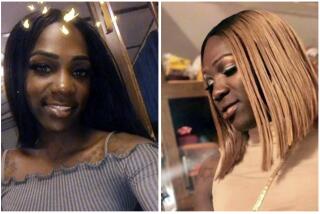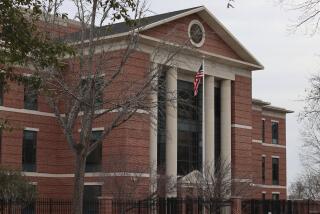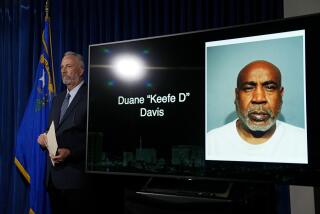Feds investigate friend of Charleston shooting suspect
- Share via
COLUMBIA, S.C. — A friend of the suspect in the Charleston church shooter is being investigated for lying to police and not reporting everything he may have known about the crime, a federal law enforcement official has told The Associated Press.
Separately, a judge said he will reconsider his ban on publication of some of the documents related to the case.
Joey Meek, 21, of Lexington, South Carolina, was notified by a so-called target letter that he is under investigation for lying to police and for knowing about a crime before or after it was committed but failing to report it, the official told the AP. The official was not authorized to speak publicly about the investigation and requested anonymity. The disclosure was first reported by The State newspaper.
Meek told the AP that Roof occasionally stayed with him at a mobile home in Red Bank, about 20 miles from Columbia, before the June 17 shootings at Emanuel African Methodist Episcopal Church. Meek said that he and Roof were school friends but went their separate ways. Then, just weeks before the shooting, Roof started coming around again.
Meek also described how Roof, while drunk on vodka, complained that “blacks were taking over the world” and that “someone needed to do something about it for the white race” before he passed out in the yard. Meek said he took away Roof’s gun the night of his rant but gave it back when he sobered up.
Meek also told the AP that he called authorities after recognizing Roof from surveillance footage from the church. He also said Roof said he used birthday money from his parents to buy a .45-caliber Glock semi-automatic handgun.
Meek is currently on probation, having pleaded guilty earlier this year to possessing a stolen vehicle, according to Lexington County court records.
Lindsey Fry, Meek’s girlfriend, told the AP on Wednesday that Meek has a good job repairing air conditioners and fears going to jail. He has been trying to get an attorney since receiving the letter.
“He’s got a good job now,” Fry said during an interview at the mobile home she shares with Meek. “He’s paying probation. We’re supposed to move soon. We’re trying to save money for a car. But now we have to do this.”
Fry, 19, said she and one of Meek’s brothers testified before a grand jury, answering questions about what Meek did after finding out about the shootings and about Roof’s activities.
Fry said she thought she appeared before the grand jury after Roof’s late July indictment on federal hate crime charges but couldn’t remember the exact date of her testimony. No other family or friends who spent extensive time with Roof at the mobile home have received target letters, Fry said.
“He’s really worried,” Fry said, of Meek. “He knows he didn’t do anything wrong. But when you’re innocent, it can be really hard to prove you are innocent.”
Rene Josey, a former U.S. attorney now in private practice in South Carolina, said federal authorities often use target letters to warn people they might be called before a grand jury and should get a lawyer.
“Maybe they’ll be more honest with you if you’re fair with them up front,” Josey said. “Most of the time, they get charged or work something out.”
The disclosure came as a judge overseeing the state case against Roof said that he would modify his order blocking the release to the media of emergency calls, witness statements and other documents stemming from the investigation into the slayings.
During a hearing that Roof did not attend, Circuit Judge J.C. Nicholson said some information ultimately could be released by authorities but expressed concern that the victims’ families would be traumatized again with the release of graphic crime scene photographs and audio tapes of the 911 calls.
“I see no benefit or reason for the news media to have access to those photographs showing people dead on the church floor,” said Nicholson, adding that, with regard to the 911 calls, “the sounds of people dying coming through on that tape are quite morbid.”
Attorneys for various news organizations, including The Associated Press, and the victims’ families agreed to meet with Nicholson behind closed doors to review the material and decide what should be released. Nicholson indicated that releasing the transcripts of the 911 calls — not the audio tapes themselves — might be the best course.
All the documents, if used at trial, would be public. While the judge didn’t say specifically when he might modify his order, Jay Bender, an attorney representing the media groups, said he expected it could be a couple of weeks.
During the hearing, an attorney for Roof said his client wants to plead guilty to the murder and other charges against him in exchange for a life prison sentence without parole. State prosecutors have said they will pursue the death penalty at trial.
During a July hearing in federal court, another attorney for Roof said his client wanted to plead guilty to 33 federal charges, but that he couldn’t advise his client to do so until federal prosecutors say whether they are seeking the death penalty.
___
Collins reported from Red Bank, South Carolina. Bruce Smith contributed to this report from Charleston, South Carolina.
___
Kinnard can be reached at https://twitter.com/MegKinnardAP
Copyright 2015 The Associated Press. All rights reserved. This material may not be published, broadcast, rewritten or redistributed.
More to Read
Sign up for Essential California
The most important California stories and recommendations in your inbox every morning.
You may occasionally receive promotional content from the Los Angeles Times.













